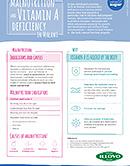VITAMIN A
Why does our body need Vitamin A?
Vitamin A is an essential micronutrient which our body needs to function properly – from enabling the function of sight, and growth and development through to skin maintenance, immune functions and reproduction.

In some countries, there is inadequate uptake of micronutrients such as Vitamin A – particularly amongst children – with these deficiencies representing a serious threat to child health. For example, Vitamin A deficiency is the leading cause of childhood blindness (25). It also increases the severity of diseases such as measles and diarrhoea and slows down recovery from illness (26).
How to identify Vitamin A deficiency
It is hard to attribute a single symptom to Vitamin A deficiency, so a combination of symptoms and factors can be an indication. These may include:
- Impaired vision such as night blindness, corneal scars and ulcerations or bitot’s spots
- Immunity is impaired and acute and chronic infections may be present
- In children stunting may occur, and they may be underweight
Preventing Vitamin A deficiency
A number of initiatives have been introduced by the Malawian Government, industry and NGOs to address the issue of Vitamin A deficiency. These include:
- Access to screening services to assess nutritional status and Vitamin A supplementation
- Improvement of hygiene, access to safe drinking water and sanitation and food security
- Inclusion of Vitamin A within the diet – either occurring naturally in foods or through fortification
As a result of these actions, there has been a significant reduction in Vitamin A deficiency in Malawi – for example, in 2015/2016, 4% of (27) – children under the age of 5 years old were Vitamin A deficient, down from 59% (28) in 2001.
Fortification of food
With the support of the Malawian Government, one way that the issue of Vitamin A deficiency is being addressed is through fortifying ingredients or manufactured products with Vitamin A.
Sugar is one such ingredient, and since 2012, Illovo Sugar (Malawi) has spent K1.1 billion on fortifying its sugar with Vitamin A to help support the elimination of micronutrient deficiency, particularly in children under five years old. In fact, through its sugar programme, it is estimated that two million people have been reached during 2017/18 (29).




